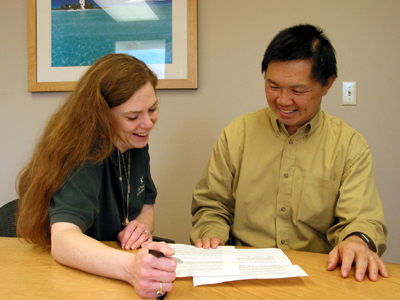


JACKSON, Miss.—Raymond Wong’s life used to operate on one speed—fast-forward.
A typical day found the Greenville restaurateur and graphic designer managing two businesses, working on construction of his 6,000-square-foot home, doing volunteer work and honing his magician skills.
Then all was put on pause the morning of Aug. 24. “All of a sudden my arm was moving like it wasn’t attached,” remembers Wong. “Then I noticed I couldn’t talk.”
His wife Cathy recognized the classic signs of a stroke and called 911. Thus began Wong’s back-from-the-brink recovery from a hemorrhagic stroke at age 51.
After months of therapy at Methodist Rehabilitation Center in Jackson, Wong now looks reborn. A thatch of newly grown hair is starting to hide the place where surgeons cracked open his skull. And he jokes that being away from his restaurant How Joy has helped him achieve a trimmer physique.
“He’s not quite his old self,” says Cathy, “but he is going to get there.” This, after all, is a man notorious for going the extra mile.
“When he played the lead in the ‘King and I,’ he got so involved he had a local hairstylist shave his head,” said Robby Scucchi, a former Greenville resident who collaborated with Wong on several community events. “He has always been one to jump into a project headfirst and see it through.”
Scucchi is now volunteer director for Methodist Specialty Care Center in Flowood. But he was still working at Delta Regional Medical Center on the morning that Wong arrived in the ER. And on that day, even those closest to Wong had to wonder if he could stage a comeback. He had suffered one of the worst kinds of “brain attack” – a stroke caused by a rupturing blood vessel.
After surviving emergency surgery to relieve pressure on his brain, Wong awoke to find he couldn’t move his right side. But that wasn’t the worst of it. Wong also struggled to convey the simplest thoughts, a frustrating turn of events for someone so glib he once co-hosted WABG’s “Good Morning Mississippi.”
Dr. Risa Nakase-Thompson, a neuropsychologist at Methodist, said this condition is called aphasia, a disorder that can rob a person of a wide range of communication skills.
“You have people who recover very well with verbal communication, but are unable to read and write. And you have some people who can write, but they can’t read what they’ve written,” she said. “Global aphasia is someone impaired in all communication domains. They are no longer able to express their wants or needs, and they have trouble understanding what others are saying to them.”
Wong and his family feel fortunate that his aphasia hasn’t been that severe. They’re also grateful that he is undergoing therapy at Methodist, where the hospital’s high number of stroke and brain injury patients gives the staff extensive experience in treating aphasia.
Methodist’s clinical staff created one of the most highly utilized screening tools for aphasia—the Mississippi Aphasia Screening Test (MAST). “We developed the test because other measures took too long to administer or only evaluated one aspect of aphasia,” Dr. Nakase-Thompson said. “Our test takes only about 5 to 10 minutes and it measures nine areas of language. The fact that we’re getting questions and people are downloading it from around the world tells me there was a need.”
Dr. Nakase-Thompson said the test is usually administered in front of family members, and it can be a real eye-opener. “I put objects in front of the patient and say point to the pen or the cup. When they’re not able to pick out these objects, that says something to the family.”
The first hours after his stroke, Wong couldn’t speak at all and frustration took its toll, said Cathy. “When he couldn’t talk to us, he would beat his head. I started crying then.”
But Wong’s rapid progress at Methodist helped the family believe he will triumph over aphasia.
“Dr. Nakase-Thompson said with most patients you see weekly progress, but his has been daily,” Cathy said. “He is a lot better in walking and talking, just everything. It’s amazing to me that he has come through all of this and he’s still so positive and upbeat.”
To improve his abilities, Wong has been throwing himself into three-day-a-week therapy sessions at Quest, Methodist’s community reintegration program for people with brain injuries. A team that includes a neuropsychologist, a speech therapist, occupational therapist and physical therapist puts him through his paces as he practices language and communication skills and works on the strength and range of motion in his right arm, shoulder and leg.
“He’s always aiming for perfection, which drives him to achieve his goals,” said Quest speech therapist Cassie Means. “But because he’s a perfectionist, he doesn’t give himself a lot of credit for what he can do. He’s very hard on himself.”
A major frustration for Wong had been his inability to do magic involving sleight of hand or manipulation. But with a little urging from his physical therapist, Wong managed to devise a new means of performing “magical mystery with cards” using a cell phone and a sidekick he calls Mr. Wizard.
“That gave me a sense of accomplishment,” he said.
As time goes by, Wong continues to notice improvements. “I can walk a little better. I can use my right hand more. I can do a little on the computer now and read my e-mail.”
But while he appreciates these advances, the veteran multi-tasker admits: “I want to be like I was.”
That means being able to drive, to go back to work and to give back to the community that rallied around his family members in their time of need. “I’m hoping to help with the March of Dimes Telethon in February,” Wong said. “There must be a mission for me to still be here. I hope that’s true.”
